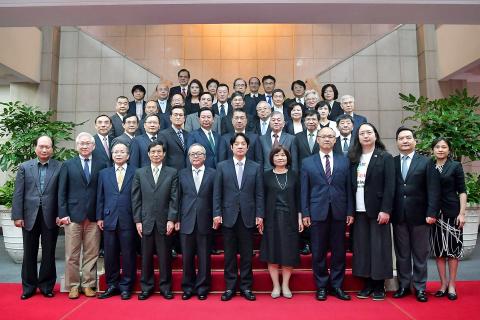As his Cabinet yesterday resigned en masse, outgoing Premier William Lai (賴清德) said that he had no regrets about his time in office and hoped he would meet all his team members again “on the road to making Taiwan great.”
Lai called an extraordinary Cabinet meeting, during which he and Cabinet members affixed their official seals to a joint resignation addressed to President Tsai Ing-wen (蔡英文).
After shaking hands with each Cabinet member at a ceremony, Lai gave a farewell speech.

Photo: CNA, provided by the Executive Yuan
After he took office, Lai encouraged his Cabinet to be pragmatic, he said, citing countless policy meetings and a tour of the nation’s 22 cities and counties to take stock of their progress on the Long-term Care Services Program 2.0 and the Forward-looking Infrastructure Development Program, and assess their development needs.
It was a period of joyous moments and tragedies — such as a Puyuma Express train derailment in October last year and flooding in central and southern Taiwan in August last year — but Lai said that had no regrets or complaints about the time he spent “developing the nation, boosting the economy, serving the people and nourishing Taiwan.”
After the Democratic Progressive Party suffered crushing defeats in the Nov. 24 local elections, public frustration with the government could not be assuaged by Tsai’s resignation as party chairperson, so as the premier, he had to take responsibility, Lai said.
He told the public that he would resign at the appropriate time and with the general budget on Thursday clearing the Legislative Yuan “the time has come,” he said.
At a legislative question-and-answer session in November last year about the government’s handling of the Puyuma Express accident, he was reminded of the three terms he served as a lawmaker, Lai said, adding that the period bolstered his belief that accountable governance is the bedrock of democracy and taking responsibility is the highest expression of that accountability.
Only by resigning could he help Tsai overcome old obstacles and perform better, opening up new frontiers, Lai said.
“Here is where we met and it is where we will part. If fate so decides, we will meet again on the road to making Taiwan great,” he said.

A preclearance service to facilitate entry for people traveling to select airports in Japan would be available from Thursday next week to Feb. 25 at Taiwan Taoyuan International Airport, Taoyuan International Airport Corp (TIAC) said on Tuesday. The service was first made available to Taiwanese travelers throughout the winter vacation of 2024 and during the Lunar New Year holiday. In addition to flights to the Japanese cities of Hakodate, Asahikawa, Akita, Sendai, Niigata, Okayama, Takamatsu, Kumamoto and Kagoshima, the service would be available to travelers to Kobe and Oita. The service can be accessed by passengers of 15 flight routes operated by

Alain Robert, known as the "French Spider-Man," praised Alex Honnold as exceptionally well-prepared after the US climber completed a free solo ascent of Taipei 101 yesterday. Robert said Honnold's ascent of the 508m-tall skyscraper in just more than one-and-a-half hours without using safety ropes or equipment was a remarkable achievement. "This is my life," he said in an interview conducted in French, adding that he liked the feeling of being "on the edge of danger." The 63-year-old Frenchman climbed Taipei 101 using ropes in December 2004, taking about four hours to reach the top. On a one-to-10 scale of difficulty, Robert said Taipei 101

MORE FALL: An investigation into one of Xi’s key cronies, part of a broader ‘anti-corruption’ drive, indicates that he might have a deep distrust in the military, an expert said China’s latest military purge underscores systemic risks in its shift from collective leadership to sole rule under Chinese President Xi Jinping (習近平), and could disrupt its chain of command and military capabilities, a national security official said yesterday. If decisionmaking within the Chinese Communist Party has become “irrational” under one-man rule, the Taiwan Strait and the regional situation must be approached with extreme caution, given unforeseen risks, they added. The anonymous official made the remarks as China’s Central Military Commission Vice Chairman Zhang Youxia (張又俠) and Joint Staff Department Chief of Staff Liu Zhenli (劉振立) were reportedly being investigated for suspected “serious

Taiwanese and US defense groups are collaborating to introduce deployable, semi-autonomous manufacturing systems for drones and components in a boost to the nation’s supply chain resilience. Taiwan’s G-Tech Optroelectronics Corp subsidiary GTOC and the US’ Aerkomm Inc on Friday announced an agreement with fellow US-based Firestorm Lab to adopt the latter’s xCell, a technology featuring 3D printers fitted in 6.1m container units. The systems enable aerial platforms and parts to be produced in high volumes from dispersed nodes capable of rapid redeployment, to minimize the risk of enemy strikes and to meet field requirements, they said. Firestorm chief technology officer Ian Muceus said